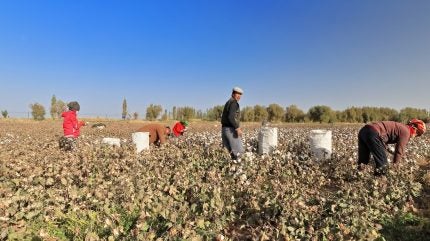
The document titled, ‘China 2024 Human Rights Report’, has accused the country of continued human right violations against primarily Muslim Uyghurs, as well as other ethnic and religious minorities in the Xinjiang region.
Data from China’s National Bureau of Statistics (NBS) reveals Xinjiang’s share of cotton production continues to grow, reaching 92.6% in marketing year (MY) 24/25, up from 90.9% in MY23/24.

Discover B2B Marketing That Performs
Combine business intelligence and editorial excellence to reach engaged professionals across 36 leading media platforms.
The topic is particularly problematic for the global fashion sector since Xinjiang supplies about 20% of the world’s cotton and 80% of China’s. Combined with other cotton to produce clothing supplied to fashion brands and retailers, it becomes difficult to track whether goods contain cotton that is the product of human rights violations.
According to the US report, “credible reports” cite human rights concerns such as allegations of “arbitrary killings”, torture, enforced medical procedures, and the detention of over one million Uyghurs and other Muslim minorities in various forms of internment facilities since 2017.
Furthermore, the document reports instances of transnational repression, significant limitations on freedom of expression and religion, coerced abortions and sterilisations, human trafficking including forced labour, suppression of independent trade unions, and “significant presence of some of the worst forms of child labour”.
The report also notes that the Chinese government “promoted racism and institutional discrimination against minorities, in particular Uyghurs, and disparaged” and “continued to promote Han Chinese migration into minority areas such as Xinjiang”.

US Tariffs are shifting - will you react or anticipate?
Don’t let policy changes catch you off guard. Stay proactive with real-time data and expert analysis.
By GlobalDataIt cited The China Brief, a publication by the NGO Jamestown Foundation, which reported in February that Xinjiang’s labour transfer programme, characterised by its coercive nature, surpassed government-set quotas in 2023.
The report indicated that this programme is projected to continue at least until 2025.
The US government says the Chinese government “did not take credible steps or action to identify or punish officials who committed human rights abuses”.
It added “there continued to be no government transparency or public statistics on executions”.
The Chinese government has been facing criticism for not adequately addressing or penalising officials responsible for these human rights abuses.
Recently, China launched a dedicated cotton yarn train service within the Xinjiang Uyghur Autonomous Region.
However, this move has raised concerns among fashion industry experts who fear it may encourage local mills to prefer domestically produced cotton from Xinjiang over imported varieties, despite allegations of forced labour in its production.
In January this year, the US Biden administration placed Huafu Fashion, along with 25 affiliated companies, on the Uyghur Forced Labor Prevention Act (UFLPA) Entity List earlier this year. This action is part of a broader initiative to eradicate forced labour from international supply chains.





